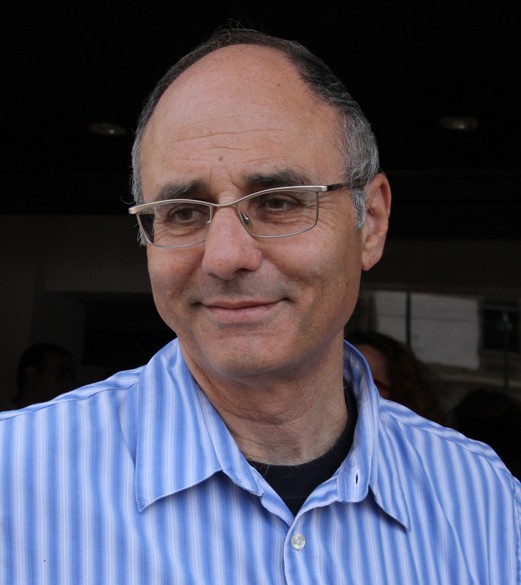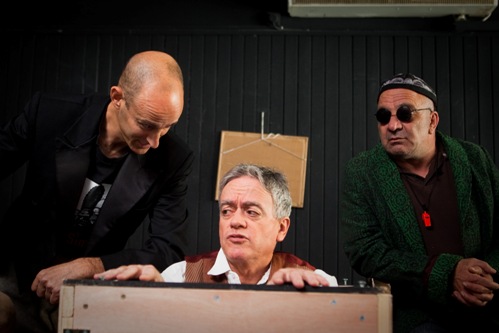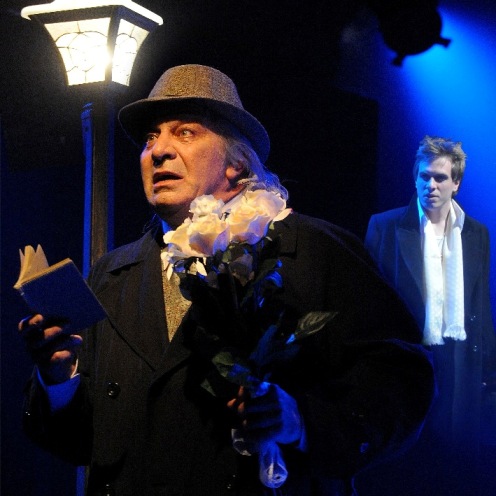
The Israel Theatre Prizes for 2009 were announced today, with the Khan Theatre winning 5 awards: Best Actor in a Leading Role to Arye Cherner as King Bonifacius Victor Felix in The American Princess, by Nissim Aloni. The play, directed by Udi Ben Moshe, also won the award for Best Revival Production. Ben Moshe also directed Les Fourberies de Scapin (Scapin’s Deceits) which won the award for Best Comedy. The award for Best Composition/Adaptation went to Yosef Brandashvili for La Grande Magia, and Best Lighting Desgin to Roni Cohen for The American Princess.
The Khan Theatre, founded in October 1967 in Jerusalem by director Philip Diskin, occupies a unique place in the Israeli theatre scene, in both the physical and philosophical sense. The theatre is situated in an historic building with arched ceilings and an intimate courtyard, with all the beauty and inconvenience which antiquity can bestow. In an interview with Artistic Director Miki Gurevitch, originally published in All About Jewish Theatre, the theatre’s distinctive character becomes immediately apparent, as the discussion of the current season is intimately connected with the theatre’s vision.
When asked about the process of selection, Gurevitch replied, “First of all, we work according to principles. The first principle is that we work with two extremes: classics and original plays. We rarely produce contemporary foreign plays. The original plays are written by me in collaboration with the ensemble. The material is created through our joint work in rehearsals. We try to create a theatrical language.”
The 2010 season reflects this approach, opening with a classic: Moliere’s Les Fourberies de Scapin (Scapin’s Deceits) directed by Udi Ben Moshe. Forthcoming are: New World Order, an adaptation of three plays by Harold Pinter, directed by Gita Munte, Samuel Beckett’s Endgame directed by Nola Chelton and Anton Chekov’s The Cherry Orchard, directed by Miki Gurevitch.
![DSC_8932[1]scapin](http://www.midnighteast.com/mag/wp-content/uploads/2010/05/DSC_89321scapin.jpg)
Another principle relates to the theatre’s organization around a permanent ensemble of actors. “We want to help the actors develop and give them new challenges. This is a factor in looking for plays. And from this point – everything is open.”
When asked if he views working with a set group of actors, as opposed to holding open auditions for each role, to be a limitation, Gurevitch said, “It might appear to be an obstacle but actually it is also a way to refresh one’s way of thinking. Because when you can take any actor in the world you will naturally choose the actor who fits the part.
When you need to use the team you have, you need to revitalize your way of thinking about the role. In my opinion this is very meaningful – this is what I discovered: more than the ensemble limits, I found that it develops the imagination and the thought process in this field. And of course it develops the actors because rather than performing only the roles for which they are suited, they also perform the roles that don’t fit them and demand that they stretch and grow.”
“This season includes plays at both ends,” says Gurevitch, “Moliere and Chekov – two classics, and two modern – Pinter and Beckett, although Beckett is really a classic.” Gurevtich describes the Moliere and Chekov plays as very “communicative” and of the others he says, “And then there are two plays that we feel obligated to present. We are a theatre that does try to be…to be also a political body. Not in the sense of left or right wing politics, but in terms of being involved in the consciousness of the audience. We try to deal with what we understand about our world – and that is what Pinter does. These three plays that Gita Munte adapted – New World Order – are plays that deal with I would say – the polarization of the American modern society that we [Israelis] also belong to. On one hand there is abundance and pleasure, and on the other hand – oppression. Beckett’s play deals not so much with the political situation as the existential. Man, old age, death – End game…

Because we are aware of the greater difficulty in connecting to these plays, we enable the audience to come to hear an introductory lecture at the theatre on Pinter and Beckett before the play. This will give the audience a chance to come a little closer before seeing the play. I’m not saying – come to a lecture. I’m saying come to a play, but in order to have an experience that is more meaningful and deep– come and devote an extra half hour – these are not long plays – hear something about the play and playwright and your experience will have more depth.”
Asked whether he expects a person coming to the theatre invest effort, Gurevitch did not hesitate: “It’s clear – just like a person reading a book needs to devote some effort to the endeavor. That is the great difference between theatre and television of course, but also from cinema. Theatre is an art that demands the audience’s cooperation; it requires the viewer’s involvement with his imagination and consciousness. You need to consent to the performance.
We sit in front of the television and when you get up your mind is blocked because nothing happens there. The theatre gives much more freedom to the viewer – if you want, accept the fact that I am a king. If you don’t want …then this object on my head is just a piece of tin, not a crown. In film you don’t have that choice. It’s a crown, a castle, a horse. There aren’t any horses in the theatre – there is make-believe.”
His thoughts on the Khan as influenced by it’s location in Jerusalem: “I suppose that it influences me because I think the Jerusalem audience …our audience, not that of the Jerusalem Theatre, that is something different, our audience is a serious audience that is a partner to our adventures, our interests. Yes I think there is a positive effect to the fact that the theatre is in Jerusalem. There is a feeling that there is interest in our work.”
Would he make different choices as an artistic director elsewhere? “I am sure that it would be different,” says Gurevitch, “this season is a little misleading, but if we look at the previous season the Chinese Knife Sharpener and The American Princess are very Israeli materials. I am completely sure that on one hand I could do many more things much more, in London for example, for we are a limited society because of the situation …because of the situation. We are not as free to …we are not as free. We don’t have the openness of Europe.

I’m not talking about an artistic director in…I’m not even talking about the fact that in say, Germany the theatre is completely different. You can produce a play that will have a run of 10 performances and that’s it. No one expects more. There was this adventure and that’s enough. We have a completely different culture. Here, a play has to have a long run, lots of people have to come – moreover, we are uptight people, we’re stressed out people who live in a particular security situation, economic, political situation. We listen to the news ten times a day. That doesn’t exist in Europe in this way. The theatre audience is completely different. Not everywhere, of course, but in places where theatre is meaningful. But that is a challenge as well. Especially in a culture like ours theatre can be very meaningful and important. To my regret, that is not the case. But it can be, we should aspire to it.”
Why does he feel that theatre in Israel has not succeeded in becoming meaningful? “Because it betrays its role, says Gurevitch, “instead of being providing an alternative to the television trash it collaborates with it. Instead of being an alternative to the cultural deterioration of thought it’s actually part of it. Of course, in order to be meaningful it [theatre] needs to limit the size of its audience. It’s perfectly clear. This amount of audience is…theatre needs to be elitist. Otherwise it has no meaning.”
Gurevitch explained his use of the term elitist thus: “It needs to appeal to people who love theatre: people who are capable of thinking in images, who can accept metaphors, who have education or who desire an education. Not people who want entertainment.
By the way, there is nothing wrong with entertainment, and there is nothing wrong with commercial theatre. But there should be a distinction between repertory artistic theatre and commercial theatre. Today there is no distinction. There used to be many commercial theatres in Israel who did wonderful things , Giora Godik produced wonderful things, Agmon did some of the most meaningful things, but the repertory theatres swallowed up this theatre with public money. Today there is no commercial theatre; there is public theatre that is commercial.”
Gurevitch is adamant about the Khan’s uncompromising approach to theatre, saying, “What makes the Khan special is the ensemble and choices that are 100% artistic. The Khan does not need plays that will bring in money and will not produce a play because it will bring in profits. A play for us is an end in itself and not the means to an end.”
The Khan is also set apart by its visual presence, both in terms of the typically minimal set design and the very physical language of the theatre. Gurevitch locates this in his understanding of the meaning of acting: “What is an actor – a poet of the body. Like a poet creates images in language, the actor creates images with the body.” In addition to his role in the Khan, Gurevitch has taught at the Nissan Nativ School for thirty years and some of the actors in the ensemble are graduates of the school. When it is suggested that this has been an influence on the physical quality of the theatre, Gurevitch concurs, saying, “I studied with him [Nissan Nativ], and later continued to teach there. The school’s orientation is one that originates in Étienne Decroux [1898-1991] in Paris – Nissan studied with him for a period. Decroux’s other students were Marcel Marceau and Jean-Louis Barrault [who portrayed the 19th-century mime Jean-Gaspard Deburau in Marcel Carné’s 1945 film Les Enfants du Paradis ] – Children of Paradise, that wonderful French film… It is really a physical orientation – the opposite of Stanislavsky. And to this is added a play that I saw in my youth – The Servant of Two Masters directed by Michael Alfred (the Khan’ssecond artistic director 1972-1975 ). This is a play that deeply influenced me, my understanding of theatre and acting.
The Khan is in a way a Commedia dell’arte ensemble because we have the same actors who switch roles. It’s a very developed form of Comeddia dell’arte, very diverse, but there is something of that form.”
As for the structure of the building itself, Gurevitch says, “It’s critical [as an influence on direction and set], that’s clear – it’s a limitation – but again, one that opens other things. We are compelled to do the minimum- not for lack of funds, but because this stage does not tolerate an over-abundance. As soon as you do this the imagination opens, and you need to find solutions that are more interesting than the set. When you put the actor in the center then you can put less emphasis on set design. Sometimes the set takes something away from the actor.”
The set for Scapin’s Deceits, the first production of the season, is very minimal indeed – a plain white square at the rear of the stage. Says Gurevitch,“It gives the audience room to imagine, an opening to the imagination.”
While the Khan might be described as a thinking person’s theatre, it is also full of pure pleasure and laughter. To this writer’s comment that the Khan can be serious and also seriously playful, Gurevitch responded, “You are 100% correct. We are always saying that there has to be joy in the work.”
AYELET DEKEL
This article was originally published in All About Jewish Theatre.





